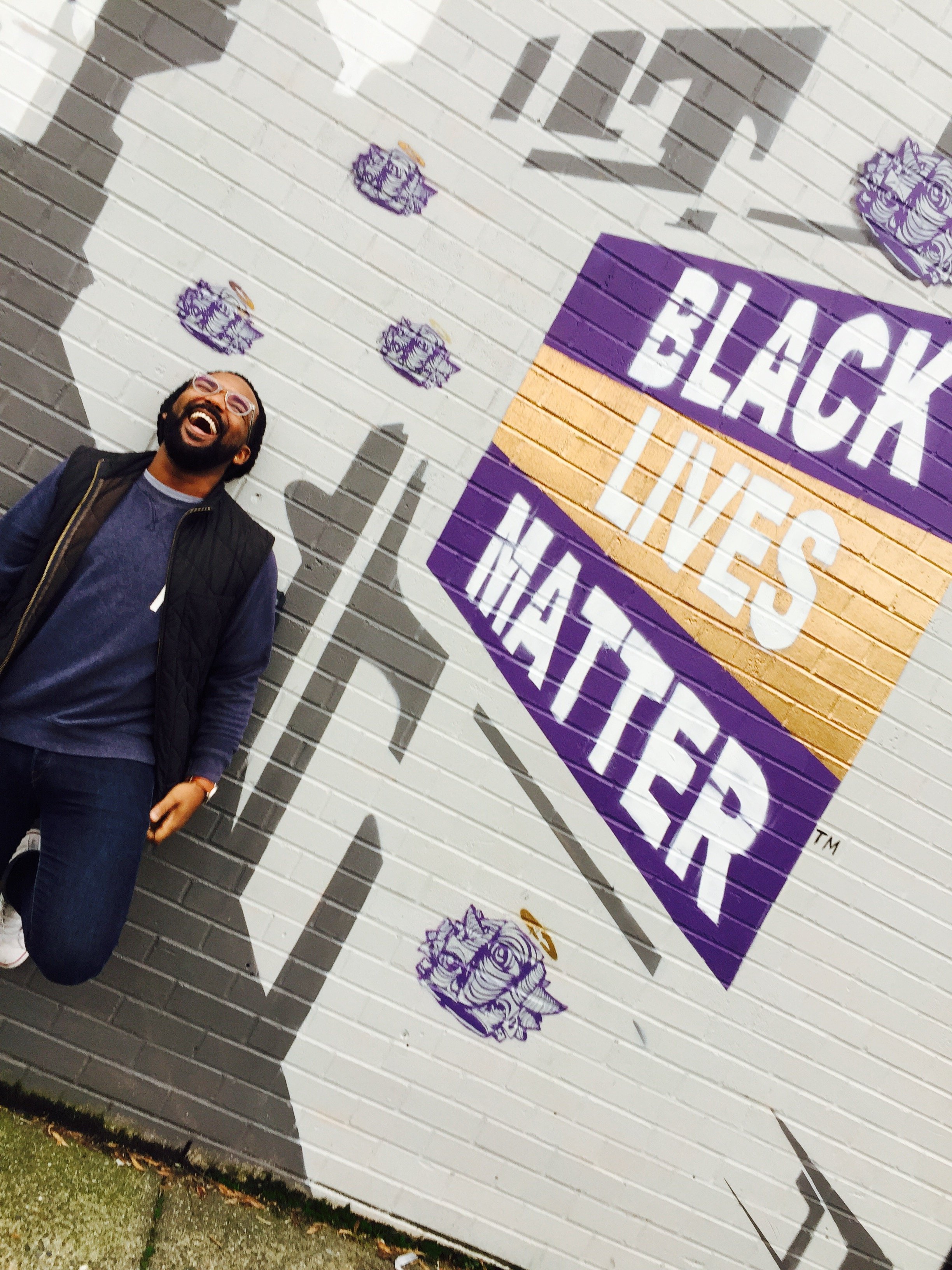
Meet our Fellows
Andre Brown, Los Angeles, California
A Soul Cleansing Documentary
Andre G. Brown: A Soul Cleansing Documentary
Los Angeles, California
Reclaiming Faith and Body in Communities of Faith
For years, Andre Brown imagined that he would become a preacher, like his father, mother, and grandfather. He grew up loving the music and drama of the Black church; however, as a gay Christian, found himself painfully misunderstood and marginalized there. While watching church during the pandemic, Brown, now an actor and filmmaker, was struck with the need to tell his story and the stories of others who had been ostracized by the theology and practice of the church that he so loved.
His new project, A Soul Cleansing Documentary, combines Brown’s love of documentaries with his experience as a gay Black Christian. His full-length documentary will share not only his own story but interviews with other LGBTQ folk who have navigated the intersection of faith, sex, and sexuality after finding themselves on the margins of church.
“For so long the Black church has denied and dismissed the personhood of queer bodies in their communities of faith. A Soul Cleansing Documentary highlights the sins of hypocrisy that had a long-standing reputation in some African American denominational churches, subsequently creating painful experiences for a large fraction of the Black queer and trans community,” writes Brown.
For his documentary, Brown interviewed over 25 LGBTQ people who grew up in the Black church and who, while loving the church, the music and the people, experienced the pain of rejection and dismissal from those same hands. His interviewees, some who remain closeted and asked for their identities to be blurred, have “endured the Black church’s use of Christian theology to dismiss their faith, life and love.” While some of the interviewees have remained in the Black church, others have left to join more diverse, open and affirming congregation or have left the faith altogether.
“This film will allow LGBTQ persons (closeted and not) to share their stories and how they have claimed their faith and bodies in the face of harmful theologies. A Soul Cleansing endeavors to bring justice, healing, and reconciliation to the black church and all its members.”
About Andre Brown
Brown’s own story set the stage for the film project. “My childhood story coincides with how my project came to be. I was the fifth and final child in my family. My dad was a preacher. My grandfather was the pastor of the church we attended as a child. The social politics were conservative, but our religious family sense was charismatic and that was exciting for me. As a child, I really just loved church, and I really loved music. I loved to see my grandfather preach, and, of course, hear and see my father preach. They were so dynamic.”
For Brown, the drama of the old Bible stories was an early lesson in theatrics. “I fell in love with a lot of the stories in the Bible, the Moses story being my favorite. My dad just made the stories in the Bible really come alive, for me as a child, and it all was supported by the songs that the choir would sing. It was so dramatic, and I just kind of fell in love with both religion and the celebration and fanfare there, and also the theatrics of it all, which ultimately led me to being an actor and filmmaker.”
Brown’s mother was also a dynamic character in his life. After his parent’s divorce, his mother returned to seminary, earning a Master of Divinity and eventually a doctorate in ministry.
Brown was torn between his pull to ministry and his love of theater. “I thought for much of my young adult life, that I would be a preacher, like my grandfather, and my father. I remember graduating from high school and thinking, ‘Oh, man, God probably really wants me to be a preacher. I probably can't act anymore. I remember it being really a large tension, in my mind and in my heart, because of the way I was raised. I thought, it's either sacred or secular. There's no way for those two worlds to collide.”
Brown also felt the tension between the teachings of the church and his questions about his own sexuality. Brown speaks candidly about navigating the shame and uncertainty of growing up gay in the Christian world. “As an adolescent and teenager, I was having crushes on guys but I was condemning myself secretly.” While in college, Brown had a relationship with a young man. “We had this romantic relationship, but we had to be so secret.”
Feeling traumatized by the shame of his secrets, Brown began counseling with Exodus International, a group known for their attempts to “bring people out of the homosexual lifestyle. I was on that journey of coming out straight. My hope, at the time, was that I was not going to be gay anymore. I was focused on the end product.”
“It was a painful, tumultuous time for me. There was so much shame. I was meeting so many men, in my exact position, men who came from very religious families with conservative politics, who loved the God of our understanding. And we wanted to be upstanding, to be righteous. We just wanted to be good.”
One friend, who was interviewed for the documentary, wrote a line that stuck with Brown - “We are singing the good news while feeling bad.’ That sentiment stayed with me because as a child I was an individual who wanted to be good. I wanted to be holy.”
Eventually, Brown began to claim his identity and his thinking and mindset shifted. “I went out for drinks with a nice young lady, a co-worker, and I found myself saying ‘Oh, you know, I’m gay. It was the first time. I didn’t want to play that game.” He moved to Seattle, Washington, entered a master’s program in theater and began to live more openly as a gay Christian.
Brown describes overcoming his sense of shame as taking one “cringy, scary, uncomfortable step at a time.” He began to find grace in authentic community. “I think community really helps. The way folks see us in community informs the way we see ourselves. It's circling back to this idea of being righteous and being holy. That affirmation of goodness helped push me past the preliminary shift into something deeper and more meaningful - beyond sexuality to personhood.”
It was during the pandemic that the idea for a documentary struck Brown. He was watching church online and began to consciously question his choice to remain in Black churches that rejected him. “For years, I had known the Black churches I was attending were problematic and I still felt the need to go to these churches with people that didn’t understand me.”
Brown felt a call to tell his own stories and stories of others like him who had been misunderstood and rejected by the Black church. “I just wanted to start again. I wanted to be baptized again. I wanted to hear what Jesus heard - This is my beloved, in whom I'm well pleased.’ I wanted my soul to be cleansed.”
“In my master’s program in theater, they kept saying “Your story is the most important story you’ll ever tell. You’ve got to create your own work and you’ve got a story worth telling.’” Brown remembered a workshop with cultural artist Anna Deavere Smith. “She does this thing called performing identities, where you perform your story through interview style theater. All of that came to me in a flash and I thought ‘I need to make a documentary.’” Brown bought a camera and began calling on his friends to share their stories.
Brown remembers meeting a woman on a train who, upon hearing about his work, asked about a friend who had committed suicide, wondering if he had committed suicide because it was challenging to be gay and be a Christian. Brown answered, “Yes, if you have never walked this journey, you will never understand what it's like - to want to be good, to want to be righteous, and to feel like you are at odds with a God you loved your whole life. You’re always saying ‘God, am I good enough yet?” This documentary is for her friend and so many others like him and that’s what this documentary is going to say - We have been good enough. We are good. We are righteous. We are holy.”
Brown’s father and grandfather are deceased now, but Brown is living out ministry in his own way. Brown hopes this documentary creates a conversation that will revolutionize the Black Church’s views and values on the uniqueness of human identity, gender expression, sex and sexuality.
He hopes to take his documentary, not only to film festivals and places like Sundance, but to church. His ultimate hope is that this documentary will “change the landscape of how the church worldwide engages, involves, and loves queer people. “
Profile by Anita Flowers







